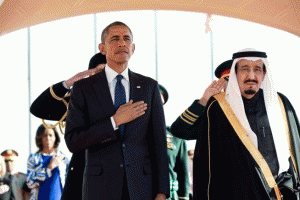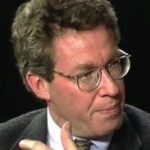An Enduring Bond
So why didn't the U.S. cut its losses by severing the Saudi partnership? Didn't it realize that the costs were beginning to outweigh the benefits? The reason is that it knew that it was complicit in the Saudi terror campaign and that the Saudis knew it too. The two countries were in it together. Both had shown staggering recklessness and duplicity in their dealings with Al Qaeda, and both therefore had too much to lose in the event of a mutual falling out.

President Obama and King Salman Arabia stand at attention during the U.S. national anthem as the First Lady stands in the background with other officials on Jan. 27, 2015, at the start of Obama's State Visit to Saudi Arabia.
(Image by (Official White House Photo by Pete Souza)) Details DMCA
The George W. Bush administration, moreover, was especially vulnerable. After the stolen election of 2000, Republicans knew that they faced mass destruction at the polls in 2004 if the full news about Bush's incompetence got out. So a cover-up was even more essential for Washington than it was for Riyadh.
This is why Secretary of Defense Donald Rumsfeld began pushing for an invasion of Iraq the morning after the Twin Towers attack. Although all evidence pointed to the Saudis, he wanted to deflect attention from Riyadh and place it on Baghdad instead. The same goes for Vice President Dick Cheney who, as Breitweiser notes, opposed a special investigation into 9/11 on the grounds that it would somehow interfere with efforts to ward off incidents that were undoubtedly on the way.
As Cheney put it in May 2002: "An investigation must not interfere with the ongoing efforts to prevent the next attack, because without a doubt a very real threat of another perhaps more devastating attack still exists. The people and agencies responsible for helping us learn about and defeat such an attack are the very ones most likely to be distracted from their critical duties if Congress fails to carry out their obligations in a responsible fashion."
An investigation into 9/11 would divert attention from the more immediate task of taking out Iraq. Yet the reality was quite the other way around. Taking out Iraq would divert attention from an investigation into 9/11. The 2003 invasion can thus be seen as a vast diversionary effort.
Its goal was to deflect attention from the real culprits, which is to say the U.S. and its Saudi partners, and shift it onto a country, Iraq, that, as former counter-terrorism czar Richard A. Clarke would later complain, had no more to do with 9/11 than Mexico did with Pearl Harbor. It was an exercise in mass deception that ended up costing an estimated $3 trillion and perhaps half a million lives.
To the degree that JASTA will help shift attention back to the Saudis, it is welcome. But if it takes aim at only one party in this grotesque pas-de-deux, and the less guilty one at that, then it could actually end up compounding the cover-up.
With oil down to $50 a barrel or so, Congress figures that the U.S. no longer has much need of Saudi Arabia and can therefore kick it while it's down. Voting to allow the survivors' lawsuit to go forward meant allowing it to take the fall, which is why it passed so overwhelmingly. But Riyadh should not accept the outcome without protest. Rather, it should do everything it can to take Washington down with it.
(Note: You can view every article as one long page if you sign up as an Advocate Member, or higher).





